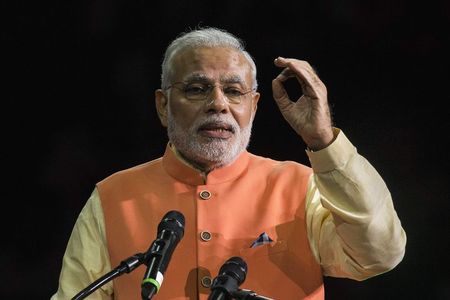By Manoj Kumar
NEW DELHI (Reuters) - India's new Prime Minister Narendra Modi has ordered government officers to work on Mahatma Gandhi's birthday, a national holiday, to clean ministries - including toilets - in a nationwide cleanliness drive.
Modi plans to honour the independence hero by launching on Thursday the Clean India campaign, which aims to solve the country's sanitation and rubbish problems within five years to mark the 150th anniversary of Gandhi's Oct 2 birthday.
Many Indian cities, including New Delhi and Mumbai, are overflowing with garbage, a result of rapid economic growth, overcrowding and poor urban planning, as well as civic behaviour that rarely condemns littering.
India's shortage of toilets costs the country more than $50 billion a year, mostly through premature deaths and hygiene-related diseases, according a study by the World Bank. India suffers a greater cost than other Asian countries from the inadequate collection of human excreta, the study found.Several officials in government departments told Reuters they had been called into work on Thursday to help clean up.
"We are all buying brooms, we are going to clean up the bathrooms here," one defence ministry official said. "This is our work now."
The order to sweep and clean latrines echoes Gandhi's own insistence that his disciples carry out tasks that in India are traditionally associated with people from lower castes.
During India's campaign for freedom from colonial British rule, Gandhi spoke about the need to improve cleanliness, saying "sanitation was more important than independence."
Since taking office, Modi has repeatedly invoked Gandhi and lamented the poor state of sanitation and public cleanliness in India. He has also vowed to clean the heavily polluted Ganges river in time for Gandhi's 150th anniversary.
GRUMBLING IN THE RANKSThe drive to clean up notoriously shabby and spit-stained government offices began weeks ago and has had a noticeable impact with broken office equipment, dangling wires and tonnes of dusty files thrown away since Modi took office in May.
The latest push was met with resistance from officials who are under pressure to work longer hours and whose attendance is now closely monitored. Some complained they have been forced to cancel plans to see family on a public holiday.
"Most of the officials are enthused by the new government's focus on growth and improving work culture, but there should be a limit to the publicity stunts," an official at one ministry said. "We have been working for nearly 10 hours a day and we are now even asked to come on a national holiday."
Modi is the first Indian prime minister to make cleanliness and fixing the country's chronic toilet shortage one of his top priorities, with a target to make the nation's major cities free of rubbish by 2019.

He says a cleaner India will help promote economic growth, reduce healthcare costs and provide employment.In a speech last week, Modi asked every Indian to devote about 100 hours a year, or two hours a week, to cleaning public places of litter.Five years ago, India's then environment minister, Jairam Ramesh, shocked many Indians when he said its cities were the world's dirtiest and that "if there is a Nobel Prize for dirt and filth, India will win it, no doubt."
(Writing By Andrew MacAskill; Editing by Tom Heneghan)
